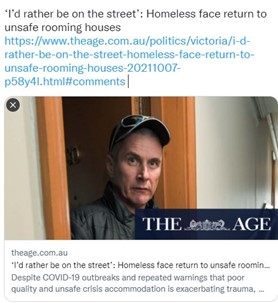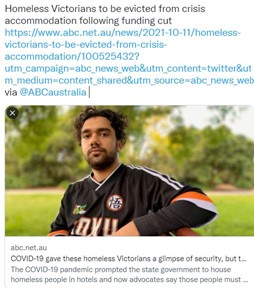A Crisis in Crisis:
The Appalling State of Emergency Accommodation in Melbourne's north and west
 The 2017 Northern and Western Homelessness Networks Annual Consumer Survey focused solely on consumer experiences of emergency accommodation, in response to feedback received in 2016.
The 2017 Northern and Western Homelessness Networks Annual Consumer Survey focused solely on consumer experiences of emergency accommodation, in response to feedback received in 2016.
The feedback about purchased emergency accommodation was overwhelmingly negative across a number of domains; in particular, the level of amenity, lack of cleanliness, high cost, and, most importantly, a perceived lack of safety and security.
 What consumers clearly stated they wanted was safe, secure, self-contained accommodation, with support available when needed.
What consumers clearly stated they wanted was safe, secure, self-contained accommodation, with support available when needed.
The feedback provided by consumers about their experience is not particularly surprising, nor is this a new story. Services and the government have known for many years that the emergency accommodation options available are of mixed quality and amenity, and many are considered unsafe for women, young people and children.
Crisis in Crisis Report
 The Northern and Western Homelessness Networks drafted the Crisis in Crisis: The Appalling State of Emergency Accommodation in Melbourne's north and west report in response to consumer feedback that highlights the crisis in crisis accommodation in Melbourne’s north and west. This report highlights the appalling conditions that people are required to live in while they wait for more secure accommodation to become available, if at all. The Report was launched in February 2019.
The Northern and Western Homelessness Networks drafted the Crisis in Crisis: The Appalling State of Emergency Accommodation in Melbourne's north and west report in response to consumer feedback that highlights the crisis in crisis accommodation in Melbourne’s north and west. This report highlights the appalling conditions that people are required to live in while they wait for more secure accommodation to become available, if at all. The Report was launched in February 2019.
Crisis in Crisis II: The Way Forward
Report of the Crisis Accommodation Options Project
 The Crisis Accommodation Options Project was funded by the Department of Families, Fairness and Housing to further explore the issue of emergency accommodation, highlighted in the Crisis in Crisis report, and to provide recommendations on a way forward.
The Crisis Accommodation Options Project was funded by the Department of Families, Fairness and Housing to further explore the issue of emergency accommodation, highlighted in the Crisis in Crisis report, and to provide recommendations on a way forward.
The Project has provided the Sector with the opportunity to explore the use of the Housing Establishment Fund (HEF) within the context of the current housing market; the Sector’s reliance on the private accommodation Sector; and the client experience of HEF in greater detail.
During the initial stages of the project, the COVID-19 pandemic rapidly and significantly changed the operating environment within the Homelessness Sector. This meant that, although the original focus of the project on emergency accommodation did not change, we were afforded a unique opportunity to test many of our assumptions about improving the emergency accommodation response.
The changed conditions during the pandemic included:
- Purchase of better quality accommodation
- Allocation of a substantially larger amount of funding
- Provision of longer lengths of stay, offering greater stability for consumers • Use of the ‘buying power’ of HEF and negotiations with private providers
- Re-allocation of support services to people in hotel accommodation
- Improved linkages with allied services.
Overall, the Crisis Accommodation Options Project has reinforced the final conclusions of the Crisis in Crisis report:
- it is unrealistic to expect a private, for profit Sector to appropriately respond to the needs of those in crisis and that the Sector’s reliance on low end accommodation, which is rated as ‘inappropriate and unsafe’, is exacerbating the trauma experienced by consumers; and that
- provision of emergency accommodation, particularly in the absence of sufficient support capacity, contributes to ‘churn’ amongst those experiencing homelessness and is not contributing the achievement of appropriate long-term housing outcomes.
 However, the response to the pandemic showed us that some changes to the current system have the potential to ameliorate some of the trauma experienced by people who are placed in emergency accommodation. One of the most significant examples of this was the establishment of the Hotel Emergency Response, which involved the placement of support, health and security staff onsite in high use hotels. This was identified by consumers, support workers and hoteliers as a significant improvement to the safety and responsiveness of this accommodation.
However, the response to the pandemic showed us that some changes to the current system have the potential to ameliorate some of the trauma experienced by people who are placed in emergency accommodation. One of the most significant examples of this was the establishment of the Hotel Emergency Response, which involved the placement of support, health and security staff onsite in high use hotels. This was identified by consumers, support workers and hoteliers as a significant improvement to the safety and responsiveness of this accommodation.
Embargo
 As of 1st March 2020, homelessness services in Melbourne's north and west ceased referrals to the worst private rooming houses. See an information sheet attached.
As of 1st March 2020, homelessness services in Melbourne's north and west ceased referrals to the worst private rooming houses. See an information sheet attached.
Mary Gearin, ABC News, covered this action in an ABC new report and online. It's a powerful article: https://www.abc.net.au/news/2020-03-01/worst-housing-providers-boycotted-by-melbourne-homelessness-age/12008182.
You can view the news items at: Watching ABC News VIC Sunday 1/3/2020 in iview https://iview.abc.net.au/show/abc-news-vic/series/0/video/NU2031V009S00 Click on 1/3/20 and then the item is 9 minutes and 12 seconds in to the bulletin. Congratulations to Jade Blakkarly, Vicky Sutton and Catherine Dyer for representing the Sector so well.
Media: Crisis in Crisis
The Age: No more referrals to dodgy crisis housing, warn homelessness services
 See the article by Miki Perkins, writing in The Age today (15/2/19). "We’re not funded to create harm, we’re funded to help people. What we’re saying is that we need to stop doing this." Click here for the full article: https://www.theage.com.au/national/victoria/no-more-referrals-to-dodgy-crisis-housing-warn-homelessness-services-20190214-p50xu7.html
See the article by Miki Perkins, writing in The Age today (15/2/19). "We’re not funded to create harm, we’re funded to help people. What we’re saying is that we need to stop doing this." Click here for the full article: https://www.theage.com.au/national/victoria/no-more-referrals-to-dodgy-crisis-housing-warn-homelessness-services-20190214-p50xu7.html
ABC News: Appaling, extremely unsafe motels pockets millions
 See the ABC News item: https://www.abc.net.au/news/2019-02-15/family-violence-victims-sent-to-unsafe-motels-in-housing-crisis/10793992
See the ABC News item: https://www.abc.net.au/news/2019-02-15/family-violence-victims-sent-to-unsafe-motels-in-housing-crisis/10793992
ABC News interviews Kathy who became homeless through no fault of her own. For 18 months she was forced to move between hotels and rooming houses. At one point homelessness services had no option but to refer her to a hotel room that had no sheets, blankets or pillows. Kathy and her partner were forced to sleep on a filthy, stained mattress with their clothes for warmth - and this cost the community $120/night. Surely we can do better as a community to support vulnerable people.
Launch: Crisis in Crisis
 Attached is the speech by George Hatvani, Launch Housing and the Consumer Participation Working Group, launching the "Crisis in Crisis" report.
Attached is the speech by George Hatvani, Launch Housing and the Consumer Participation Working Group, launching the "Crisis in Crisis" report. Attached is the speech by George Hatvani, Launch Housing and the Consumer Participation Working Group, launching the "Crisis in Crisis" report.
Attached is the speech by George Hatvani, Launch Housing and the Consumer Participation Working Group, launching the "Crisis in Crisis" report.
Consumer feedback
 Below is a powerpoint covering some of the consumer feedback received on emergency accommodation in Melbourne's north and west.
Below is a powerpoint covering some of the consumer feedback received on emergency accommodation in Melbourne's north and west.


